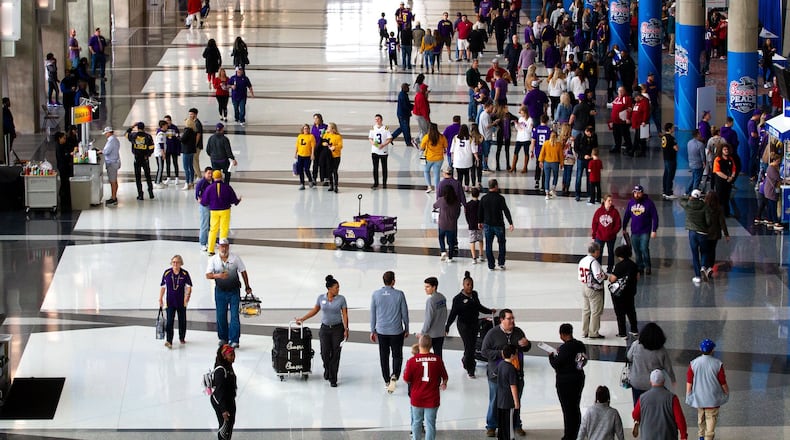After steering smoothly through a decade of growth, the metro Atlanta economy is cruising into dangerous waters – and each virus-linked development makes the approaching rapids choppier.
While the number of confirmed cases of COVID-19 remains small, efforts to contain the outbreak mean canceled events, fewer visitors and chilled consumer spending.
"We are expecting a 30 to 50% drop in the hospitality business over the next two months," said William Pate, chief executive of the Atlanta Convention and Visitors Bureau. "You don't need people to clean rooms that aren't occupied. You don't need people to work in restaurants if no one is eating there."
His grim assessment came as Wall Street had its worst day since the 1987 Black Friday crash while the worlds of business, sports and travel reeled from cancellations.
President Donald Trump announced late Wednesday a one-month ban on travelers from much of Europe — a huge blow to the economy of metro Atlanta, which generates revenue and jobs from Hartsfield-Jackson, the world’s busiest airport.
Sports was in shutdown mode as one league's retreat followed another: The National Basketball League suspended its season, Major League Baseball announced a two-week hiatus, the NCAA canceled its national basketball tournaments and Major League Soccer suspended all matches for at least 30 days. Atlanta has professional teams in all three sports —and was set to host the NCAA men's Final Four in early April.
Organizers of the Thomas P. Hinman Dental Meeting – which typically attracts more than 20,000 people – announced they were cancelling this year's gathering set for March 19 at the Georgia World Congress Center and Omni Hotel. A slew of corporate meetings have also been called off.
Cancellations of high-profile events can ripple through a local economy, said Rajeev Dhawan, director of the Economic Forecasting Center at Georgia State University.
"For starters, this is bad news for hotels, restaurants and business surrounding the arena," he said. "But there's also sales tax lost for MARTA, for the state, for the city – they all take a financial hit."
Support businesses – the local contractors who provide catering, security, painting, cleaning and other help for big events – also lose their paychecks.
Attractions like the Georgia Aquarium, National Center for Civil and Human Rights or Stone Mountain Park draw fewer tourists.
And unlike a storm, which might confine consumers for a day or two, when tourists don’t come to town, their money simply doesn’t come to Atlanta, Dhawan said.
It's also a rude awakening after metro Atlanta's January unemployment rate was 3.2%, historically a low figure. The region has added jobs each year since 2010, including 54,100 from January 2019 to January 2020.
The mounting economic risks go far beyond fewer visitors.
"While it's unfortunate to lose out on the Final Four, the Atlanta economy probably faces more damage from a shutdown of normal business that is disrupted" by coronavirus-related stoppages, said economist J.C. Bradbury of Kennesaw State University.
“If large groups of people are quarantined, supply chains will be broken, which will affect everyone in every line of work,” he said. “Losing a weekend of basketball business is a minor blip compared to the size of the city and state economy.”
A typical recession chills demand for products and services, but the virus has also shuttered many Chinese plants. That means a lack of parts and goods – and that supply shortage is going to hit Georgia in the next few weeks, said economist Jon Gabrielsen.
Loss of business means some workers losing jobs and others worrying they’ll be next – and when consumers spend less, it means more layoffs, Gabrielsen said. “And that is when what was a virus that triggered a supply shortage causes a demand shortage, making this a self-perpetuating downward spiral.”
The flow of containers into Georgia ports dropped by 18% in the first two weeks of this month – a plunge not seen since the worst of the Great Recession, according to Robert Morris, spokesman for the Georgia Ports Authority.
Yet early signs are that the shipments will pick up somewhat after that, which might mean the supply chain disruption is not as bad as expected, Morris said. “It’s too early to tell, but initial signs show a gradual improvement in cargo volumes.”
Less debatable is the impact of the flight ban for travelers from Europe, slated to go into effect Friday at midnight.
Atlanta had an estimated 1.3 million international visitors last year, with 25% of them from Europe, according to preliminary estimates provided to the Atlanta Convention and Visitors Bureau.
The share price of Atlanta-based Delta Air Lines, viewed by analysts as the U.S. airline most affected by the travel restrictions, plunged 21% Thursday, roughly twice as much as the U.S. stock market. Delta has 90,000 employees, including more than 36,000 in Georgia.
As the world’s busiest airport, Hartfield-Jackson is an economic engine for the entire Southeast, with 63,000 workers based at the facility. Airport officials say the facility generates $82 billion in economic impact.
Staff writer Kelly Yamanouchi contributed to this article.
About the Author
Keep Reading
The Latest
Featured



